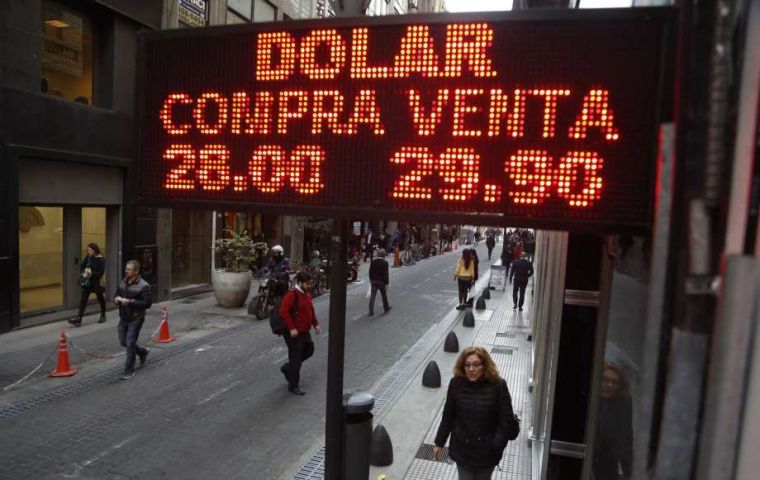MercoPress. South Atlantic News Agency
Argentine Peso and equities end the week back on skid row
 The US dollar was trading at almost 30 Argentine Pesos on Friday afternoon until it finally closed at 28.85, with a daily depreciation vs the greenback of 2.53%
The US dollar was trading at almost 30 Argentine Pesos on Friday afternoon until it finally closed at 28.85, with a daily depreciation vs the greenback of 2.53% After a week of relative stability, the Argentine peso slid more than 2.5% percent on Friday, as an economic crisis marked by high inflation, wobbly growth and an outflow of capital began to bite again.
The Argentina's peso, like currencies in other emerging markets, has come under pressure from a flight of capital to safe havens in the wake of a string of interest rate hikes by the U.S. Federal Reserve. Argentina's annual inflation rate is running at over 25%.
The central bank sold US$ 300 million on Friday to support the currency.
The US dollar was trading at almost 30 Argentine Pesos on Friday afternoon until it finally closed at 28.85, with a daily depreciation vs the greenback of 2.53%, and overall loss of 35% in the first half of the year.
Likewise the Argentine Merval index dropped 2.8%, despite equities rising across the region. Following an attempted recovery on Thursday, the US dollar uncertainty and negative info from the economy took their toll.
Friday releases of weaker manufacturing and slowing down of the construction industry hit the market, but even more impacting was the apparent radical change in the energy and public utilities policy.
In effect cabinet members apparently sponsor a freezing of public utilities rates, with the burden of power and gas going to distributors. This was interpreted as a “political truce” with the opposition and provincial governors, who even before the current situation faced severe budget shortfalls in their administrations.




Top Comments
Disclaimer & comment rules-

-

-

Read all commentsDT,
Jul 05th, 2018 - 05:01 pm +2“Did the article change your mind in any way on Argentina's problems?”
Yes, I think it did. The default response on here is that all of Argentina's problems originated and are perpetuated by Peronism. This article indicates that the problems originated later with the military coup, but I wonder to what extent Peronism has held back the healing process.
My wife commented to me today that CFK has created an angry youth in Argentina who complain, often violently, about absolutely everything. They are now complaining about a new organ donor law that means that you are by default a donor unless you opt out. Why are they complaining? If you don't want to donate then just opt out and stop making crazy claims about Macri stealing your organs!
Although Reekie is somewhat ancient, I include him as part of the angry youth created by CFK.
Reekie,
Jul 03rd, 2018 - 05:14 pm +1“However, Argentina has shown in the past it can overcome its worst periods - and it comes back with a vengeance.”
You have a track records of making claims without supporting evidence but this one must take the biscuit!
Read http://archive.economonitor.com/blog/2014/02/argentina-the-myth-of-a-century-of-decline/ for an interesting and informed opinion.
DT,
Jul 05th, 2018 - 09:08 pm +1“After watching Macri take over from CFK, I wonder if part of the problem may be too much ideological extremism.”
I think there is a lot in that.
“Eg, the sudden devaluation of the peso,”
I think that the peso had already devalued. Remember the blue peso? When he let the peso float it simply adjusted to the true market value of the blue peso. So although the official peso devalued under Macri, it had already devalued under CFK.
”changing rapidly from a policy of protectionism under CFK to open markets under Macri, going from overly high taxes on agricultural exports to no taxes, switching between nationalising and privatising large companies (with opportunities for corruption each time)... how can anyone plan for the future when they get the rug pulled from under them like that? A suboptimal policy might well be better as long as it's consistent.“
Yes, but he sold it as a gradual change and some would say that he didn't do enough fast enough. I don't know, I am not an economist.
”Also look how many people distrust the respective governments... I wonder if it is things like these that the author is talking about when he mentions healing the wounds in society?“
Yes, I think that this is a large part of it.
”Finally, considering Enrique lived through the dictatorship, and for all I know left his homeland because of it, I'm sure any anger he holds long predated CFK.”
Good point, but he clearly does not like Macri. ;-)
Commenting for this story is now closed.
If you have a Facebook account, become a fan and comment on our Facebook Page!